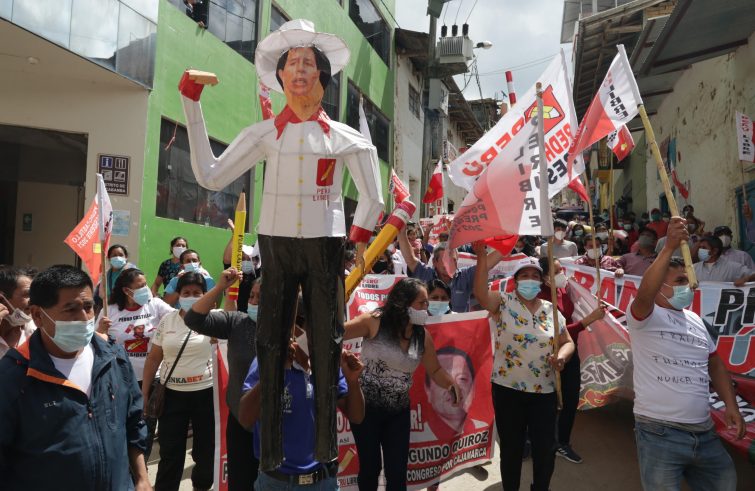
A presidential election too close to call. Ultimately, in the last 24 hours Castillo gained a last-minute lead as the ballots count became as sensational as the electoral campaign that preceded it. Peru’s polarized presidential race between the left-wing politician, Cajamarca schoolteacher Pedro Castillo, a self-described “Marxist but not communist”, and right-wing presidential candidate Keiko Fujimori, daughter of the former dictator Alberto, in her third consecutive runoff, was decided by a handful of votes, but the final word has not yet been spoken. Fujimori maintained lead with most of the ballots counted, but as results came in from rural Andean sections, especially in the centre and south, results started to reverse the picture.
Castillo now leads by about 100,000 votes.
The only unknown factor that keeps his opponent’s hopes high is the outcome of the polls in overseas polling stations, where she had a clear lead, especially in the USA. But paradoxically, the Lima Stock Exchange crash, down by almost ten percentage points, indicated the likelihood of Castillo’s victory.
The ‘spectre of communism’. Concerns regarding a ‘communist’ president determined to expropriate companies ( albeit repeatedly refuted by the latter, who has in fact watered down his proposals over the last few weeks), a two-month hammering election campaign, uncertainties surrounding the competences of a president whom the Lima establishment regards as a veritable outsider, coupled by questions about the solidity of his political team and his cabinet proposal, all themes that surfaced during the election campaign, cannot be dispelled in the blink of an eye.
Moreover, the task awaiting the new president is a cause for anxiety and concern.
On the other hand, similar doubts, controversies and uncertainties, albeit of a different nature, would have followed Keiko Fujimori’s victory, given her promise to release her autocrat father, herself charged of corruption and detained for a year and a half during the last legislature.
A divided Country. However, besides the polarising election dynamics,
a further divide emerges at a deeper level between Lima and Pacific coastal cities, and between the Sierra region and rural villages.
In fact, while Fujimori won overwhelmingly in Lima, consensus for Castillo in the inland regions of Puno, Cuzco, Ayachucho and elsewhere was plebiscitary, in some cases exceeding 90%. A bishop from the southern part of the country recently told his confreres that all his priests, even the most conservative ones, supported Castillo. These are indications of a widespread malaise that went unnoticed for far too long.
 “As a whole, the people feel very distant from Lima”, Msgr. Reinaldo Nann, bishop of the prelature of Caravelí, in the region of Arequipa, a divided territory not only in geographic terms , between the coast and the sierra, but also politically, told SIR. “This is a poor territory,”, the Bishop remarked, “with widespread informal mining and traditional farming practices. Produce is paid at negligible prices with high rates of emigration to the larger cities. As a result, the local communities vote for candidates who represent a change, someone new and unknown. Here, five years ago, the majority of votes went to left-wing candidate Verónika Mendoza, but the right-wing opposition won the parliamentary elections.
“As a whole, the people feel very distant from Lima”, Msgr. Reinaldo Nann, bishop of the prelature of Caravelí, in the region of Arequipa, a divided territory not only in geographic terms , between the coast and the sierra, but also politically, told SIR. “This is a poor territory,”, the Bishop remarked, “with widespread informal mining and traditional farming practices. Produce is paid at negligible prices with high rates of emigration to the larger cities. As a result, the local communities vote for candidates who represent a change, someone new and unknown. Here, five years ago, the majority of votes went to left-wing candidate Verónika Mendoza, but the right-wing opposition won the parliamentary elections.
There is a desire for change, and rural teacher Pedro Castillo was perceived as “one of them”, a “country man”.
This is clearly a highly sentimental and spontaneous reaction, emotional rather than rational. The people’s support for Castillo is mostly among the campesinos, in the mountainous area of the prelature. In contrast, in coastal districts, numerous business owners voted for Keiko Fujimori.”
“I don’t think Castillo and his party members are sufficiently qualified to govern the country’s economy”, added Msgr. Nann, “but then again, I didn’t trust Keiko Fujimori either. However, as a Church, we must move forward without fear, rejecting simplistic recipes and assumptions, such as those we heard during the election campaign, for example on communism. Things are not that simple.”
Economic downturn. Will Castillo manage to respond successfully to the challenging economic crisis afflicting the country, with a double-digit drop in GDP caused by the COVID-19 emergency?
 According to Italian-Peruvian Economist César Ferrari, Professor at the Javeriana University in Bogotá (Colombia), former President of the Banco Central del Peru and International Monetary Fund executive in Africa, “it’s a very challenging context, both economically and politically.
According to Italian-Peruvian Economist César Ferrari, Professor at the Javeriana University in Bogotá (Colombia), former President of the Banco Central del Peru and International Monetary Fund executive in Africa, “it’s a very challenging context, both economically and politically.
The country was faced with two complex choices: on the one hand, the daughter of a dictator and a symbol of corruption, and on the other, a person with unclear objectives. Many voters faced a dilemma and decided not to cast their vote.
However, it is also necessary to understand why we have reached this point, and why the whole continent is seething with tensions. In my opinion, the liberalist policies of the various right-wing governments are the chief cause of this. This profit-driven model has reached its final stage, it exhausted its potential, as is evident in the United States and in Biden’s first decisions. We are witnessing a revival of Keynesian policies after many decades.”
Nonetheless,
“in Peru the response was driven by desperation, a visceral response.”
This is happening in the country “with the most critical economic situation in South America”, excluding Venezuela. According to the economist, “the only way to try and get back on track is a large injection of public spending, without which there would not even be a foundation for private investment. After all, this is what is being done in every world country.” It’ s a daunting challenge for Castillo: “if it goes well, he could become a new version of Evo Morales.”
We shall see. For Wilfredo Ardito Vega, jurist and expert in human rights at the Catholic University of Peru, “certainly a campaign has been orchestrated against the Castillo’s alleged communism, almost as if he were Stalin. Personally, as someone who is concerned about human rights, I was surprised to see that, especially here in Lima, people seem to have forgotten about the many crimes of Fujimori’s dictatorship, focusing on their own well-being instead.”
Moreover,
Castillo is a person who cannot be described according to clichés. He is left-wing, yet also a religious man who is deeply attached to the traditions of his region. He opposes abortion and LGBT ideology.
“I met him years ago in Cajamarca, he is a friend of Pepe Mujica and Evo Morales, but he lacks their charisma. He created a name for himself by battling against the gold mines”, said Cristiano Morsolin, a human rights expert. “It’s a place with no electricity, no water, no internet access. Thus the rebellious voice of an Andean left-wing, a somewhat conservative and ethnocentric left-wing, has asserted itself. It will be a government force if it manages to welcome other political contributions, thereby helping to strengthen a yet fragile democracy.”
(*) journalist, “La voce del Popolo”












